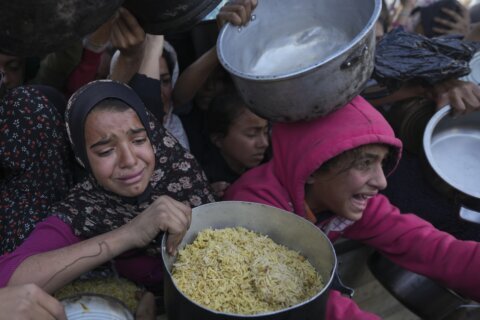ROME (AP) — Italy on Wednesday criminalized citizens who go abroad to have children through surrogacy, a measure slammed by opponents as “medieval” and discriminatory to same-sex couples.
The measure extending a surrogacy ban in place since 2004 was promoted by Premier Giorgia Meloni’s far-right Brothers of Italy party and its conservative coalition partner, the League, asserting that it protects women’s dignity.
The Senate after a seven-hour debate passed the bill 84-58, the final step in the process after the Lower House’s approval last year.
Italians seeking surrogacy in countries such as the United States or Canada, where the practice is legal, can face up to two years in jail and up to 1 million euros ($1.1 million) in fines.
The surrogacy ban applies equally to all couples. But same-sex parent advocates say it hits gay families particularly hard in a country struggling with record-low birthrates and where only heterosexual couples are allowed to adopt.
Same-sex marriages are also banned in Italy, and LGBTQ+ couples have been fighting to obtain parental rights for the partner who is not the biological parent.
Several lawmakers and LGBTQ+ activists protested in front of the Senate to oppose the law, some holding banners that read: “Parents, not criminals.”
“When protectionism prevails, a social phenomenon is not erased,” opposition lawmaker Riccardo Magi said during the protest. “It is simply relegated to a dark area, which the law doesn’t reach. In that case, it’s easier for exploitation, abuse and rights violations to prevail.”
“We are very saddened because Italy has once again missed an opportunity to demonstrate that it is a country in line with what Europe and the world are,” said Cristiano Giraldi, the father of two 10-year-old children born from a surrogate mother in the U.S.
The Catholic Church has strongly opposed surrogacy in Italy and abroad, with Pope Francis calling for a universal ban and criticizing what he called the “commercialization” of pregnancy.
At the same time, the Vatican’s doctrine office has made clear that same-sex parents who resort to surrogacy can have their children baptized.
While commercial surrogacy contracts are common in the U.S. — including protections for mothers, guarantees of independent legal representation and medical coverage — they are banned in parts of Europe including Spain and Italy.
Copyright © 2024 The Associated Press. All rights reserved. This material may not be published, broadcast, written or redistributed.





